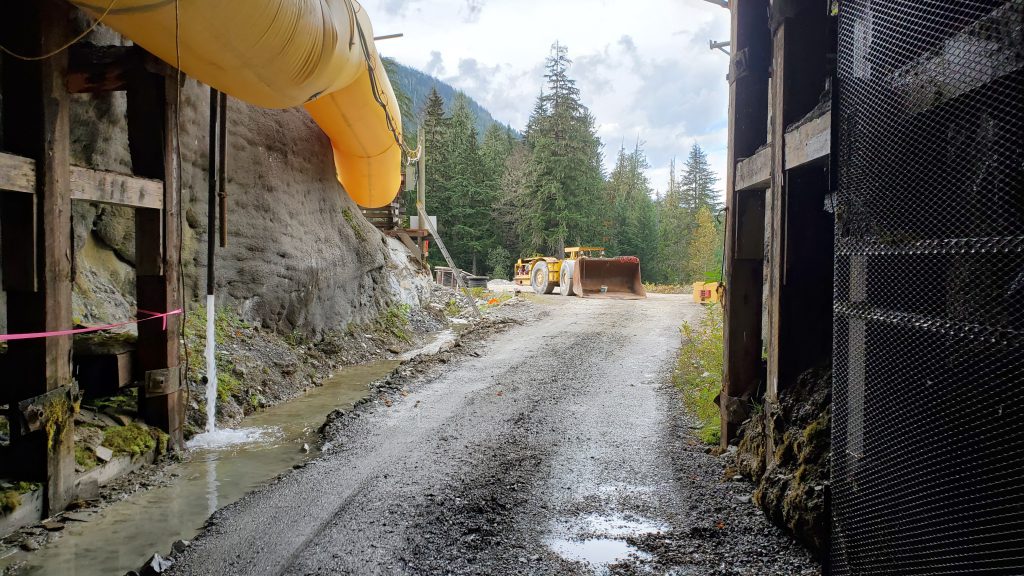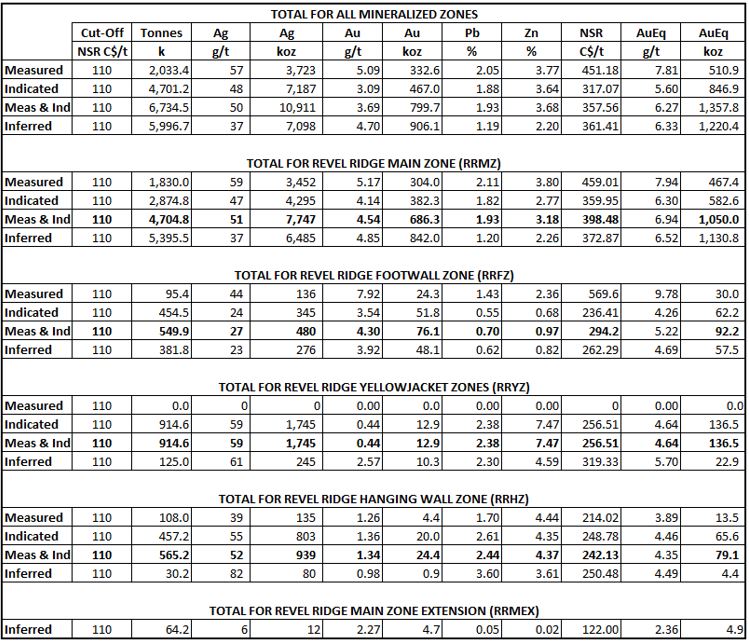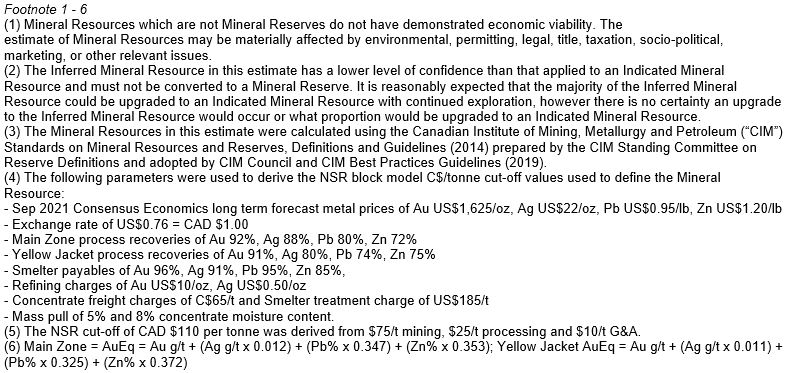Rokmaster Announces Significant Increase in Mineral Resources at the Revel Ridge Project

Rokmaster Resources Corp. (TSXV: RKR) (OTCQB: RKMSF) (FSE: 1RR1) (“Rokmaster” or the “Company”) is pleased to announce the updated Mineral Resource Estimate (“MRE”) for the Revel Ridge Project (“Revel Ridge”), located 35 km northeast of Revelstoke, B.C. Revel Ridge hosts a gold rich, polymetallic orogenic gold deposit, and is one of the largest undeveloped deposits of this type in the Western Cordillera.
The database on which the updated 2021 MRE is based includes data from 378 surface and underground drill holes totalling approximately 68,693 m of diamond drill core. The MRE also includes analytical results from 223 underground chip samples. Surface trench results have been used to constrain the Main Zone outcrop. Both drill hole and underground chip sample data have been composited over 1.0 m intervals. These data have been reviewed and validated, and the MRE estimated by P&E Mining Consultants Inc. The effective date of this MRE is November 15, 2021. A Technical Report will be filed on the Company’s website and SEDAR within 45 days of this disclosure.
Mineral Resource Estimate Highlights
- Measured and Indicated (“M&I”) Mineral Resource, in all mineralized zones, includes 1.36 million gold equivalent (“AuEq”) ounces contained within 6.73 million tonnes with an average grade of 6.27 g/t AuEq.
- Inferred Mineral Resource, in all mineralized zones, includes 1.22 million AuEq ounces contained within 6.00 million tonnes at an average grade of 6.33 g/t AuEq. (See Table 1)
- In the 2021 M&I Mineral Resource, the average NSR (“Net Smelter Return”) value of $357 per tonne is 225% higher than the $110 cut-off.
John Mirko, President & CEO of Rokmaster stated, “Our updated Mineral Resource Estimate is another milestone in establishing a potential commercial mining operation at Revel Ridge. Rokmaster has added significant gold ounces in every classification, and the system remains open. Rokmaster’s diamond drilling and comprehensive geological and geochemical surveys have developed a promising series of targets well outside of the current Mineral Resource boundaries.
In addition, our understanding of the controls on thicker and higher-grade mineralized zones has progressed significantly. Changes in that knowledge base will guide surface and underground drill programs in the 2022 exploration season, potentially leading to further expansion of  our MRE.”
Michael Cowin, Chairman & Director of Rokmaster, added, “Over the last 18 months Rokmaster has completed 27,255 metres of core drilling in 79 surface and underground drill holes at Revel Ridge. That effort has resulted in the significant organic growth of the mineral deposit, exemplified by the revised AuEq values documented in the Measured, Indicated, and Inferred 2021 Mineral Resource Estimate.
We’re seeing that we can expand the Revel Ridge Mineral Resource by increasing the number of drill holes which test it. In the upcoming months, we intend to further develop our innovative surface and underground exploration programs to strategically expand the Mineral Resource.”
Additional unreleased drill results are provided in Table 2, and the collar locations of these drill holes, are illustrated in Figure 1. The changes in the shape of mineralized zones are illustrated by the Net Smelter Return constrained domains, using all drill holes up to 2012, is documented on Figure 2, which is contrasted by Figure 3, a longitudinal projection of 2021 Mineral Resource classification boundaries.
Table 1. Revel Ridge Measured, Indicated and Inferred Gold Equivalent Underground Mineral Resources1-6
Revel Ridge Mineralized Domains
Gold mineralization at Revel Ridge is associated with planar deformation zones which cut a previously isoclinally folded sequence of Cambrian to Late Proterozoic fine-grained clastic sedimentary and carbonate rocks forming the western margin of the Kootenay Arc. Much of the mineralization at Revel Ridge has strong affinities to a class of gold deposits known as orogenic gold deposits. This deposit type forms within dilatant intervals in laterally persistent brittle-ductile deformation zones. They may be mineralized over km scale vertical distances. At Revel Ridge, the Revel Ridge Main Zone (“RRMZ”), Revel Ridge Footwall Zone (“RRFZ”), Revel Ridge Hanging Wall Zone (“RRHZ”) and Revel Ridge Main Zone Extension (“RRMEX”) all have characteristics common to orogenic gold deposits. One of the mineralized domains, the Revel Ridge Yellowjacket Zone (“RRYZ”) has differing metallurgical characteristics, different alteration styles and a unique mineralogy. The RRYZ has a signature more characteristic of a silver rich carbonate hosted replacement deposit (“CRD”).
Characteristics of the relevant mineralized domains include:
Revel Ridge Main Zone. The RRMZ is the single largest Mineral Resource domain in the 2021 MRE. The RRMZ is characterized as a highly planar, 55-60degree, northeast dipping deformation zone, with an average width of mineralization of 2.5 m. The Measured and Indicated classification of the RRMZ contains 1.05 million AuEq ounces in 4.70 million tonnes grading 6.94 g/t AuEq. The Inferred classification contains 1.13 million AuEq ounces in 5.40 million tonnes grading 6.52 g/t AuEq. Rokmaster’s expanded surface and subsurface drill program has significantly expanded the RRMZ at depth.
Revel Ridge Footwall Zone. The RRFZ is the second largest Mineral Resource domain within the 2021 MRE. The zone sub-parallels the RRMZ but is commonly located between 10 – 30 m into the footwall of the RRMZ. The RRFZ exhibits the same high strain characteristics and similar alteration styles to the RRMZ. The RRFZ may be unique, as the identification of visible gold is more common in this zone, particularly at deeper intervals of the RRFZ. Within the RRFZ, visible gold has been identified within sheeted quartz-ankerite veinlets that may be associated with red-brown sphalerite, galena and locally arsenopyrite. In the Measured and Indicated classification, the RRFZ contains 92 thousand AuEq ounces grading 5.22 g/t AuEq in 550 thousand tonnes. In the Inferred classification, the RRFZ contains 58 thousand AuEq ounces grading 4.69 g/t AuEq in 382 thousand tonnes.
Revel Ridge Hanging Wall Zone. The RRHZ is best developed in the northcentral portions of the deposit area. The RRHZ is a mineralized deformation zone that occurs sub-parallel, and a few metres to a few tens of metres into the hanging wall of the RRMZ. It has similar macroscale characteristics i.e., the development of strain related fine-grained sericite, mm- to cm-scale quartz shear bands and sheeted shear foliation parallel high sulphide veins and veinlets. In the Measured and Indicated classification, the RRHZ contains 79 thousand AuEq ounces grading 4.35 g/t AuEq in 565 thousand tonnes, and in the Inferred classification, it contains 4 thousand AuEq ounces grading 4.49 g/t AuEq in 30 thousand tonnes.
Revel Ridge Yellowjacket Zone. Of the five mineralized domains which make up the 2021 MRE, the RRYZ differs significantly from all other mineralized domains. The RRYZ is a high silver, zinc – lead carbonate replacement deposit hosted within silicified and replaced limestone units and occurs 50 m to 75 m into the hanging wall of the RRMZ. The RRYZ is best developed near the north-central deposit area. The down-dip extent of mineralization within the RRYZ is currently interpreted to be less than the down-dip extent of mineralization in the RRMZ. The reduced down-dip extension of mineralization in the RRYZ is a function of the role of anticlinal fold hinges in the development of this zone. RRYZ thickens near the anticlinal crests of deformed carbonate rocks and decreases along the limb position of these same rock units. The Measured and Indicated classification of the RRYZ contains 137 thousand AuEq ounces in 915 thousand tonnes grading 4.64 g/t AuEq, 59 g/t Ag, 2.38% Pb, 7.47% Zn and 0.44 g/t Au. In the Inferred classification, it contains 23 thousand AuEq ounces in 125 thousand tonnes grading 5.70 g/t AuEq, 61 g/t Ag, 2.30 % Pb, 4.59% Zn and 2.57 g/t Au.
Revel Ridge Main Zone Extension). The RRMEX is the northwestern strike continuation of RRMZ and applies to any intersection northwest of DDH RR21-54. The zone is known to extend for at least 1,800 m northwest of the 830 m portal. In the Inferred classification, RRMEX contains 5 thousand ounces AuEq in 64 thousand tonnes grading 2.36 g/t AuEq. The modest size and grade of the initial RRMEX Mineral Resource is a function of two relevant parameters:
- The 2021 surface drill program has indicated that northwest of DDH RR21-54, mineralization within the RRMEX is gold dominant with base metals and silver effectively dropping out of the system. This gold-dominance also corresponds with rising topography. An increase in the elevation at the drill collar suggests that elevation controls may have influenced the distribution of base and precious metals. The relationship may be exemplified by DDH RR21-65 and RR21-66, which are 1,800 m to the west of the 830 m portal, and intersect the mineralized deformation zone at approximately 1,300 m elevation, or 470 m above the 830 m portal elevation.
- The absence of base metals and silver in the RRMEX, decreases the continuity of mineralization. Results from better-mineralized drillholes, (e.g., RR21-58, 0.9 m of 3.81 g/t AuEq), are excluded from the 2021 MRE, as they appear to be widely isolated intersections that cannot be modeled under the parameters used for inclusion in the Inferred Mineral Resources. The deformation zone in which the RRMEX exists, is clearly gold mineralized, but those intersections do not contribute to the 2021 MRE.
Figure 1. Revel Ridge Property Location Map and Drill Hole Collars
Figure 2. Longitudinal Projection of 2020 NSR Outlines and 2020/2021 Drilling
Figure 3. Longitudinal Projection of 2021 Mineral Resource Classification Boundaries
Table 2. Summary of the Selected Assay Results of Surface Drill Holes RR21-48 – RR21-797.

Quality Assurance/Quality Control. Dr. Jim Oliver, P. Geo. supervised all aspects of the drilling and sampling undertaken in the 2021 underground and surface diamond drill program. All samples have been collected from ½ NQ core, sawn with a diamond saw with the sample intervals marked by technical personnel. A full QAQC program using blanks, standards and duplicates was utilized to monitor analytical accuracy and precision. QAQC samples are submitted approximately at every 20th sample, or a minimum of 5% of the total sample stream is be represented by QAQC samples. Two standards are used and are designed to provide information on (a.) higher grade characteristics of mineralized intervals and (b.) on mid-grade samples. A limestone blank is inserted after any sample which has macroscale characteristics of higher-grade mineralization. Duplicate samples are repeat analysis of pulp samples from the designated primary sample. The samples were sealed on site and shipped to MSA Labs in Langley, British Columbia. MSA is an ISO 17025 (Testing and Calibration Laboratory) and an ISO 9001 (Quality Management System) Certified Laboratory. Drill core samples were crushed to 2 mm and a 500-gram sub sample was pulverized with 85% of the sample passing 75 microns. The sub-sample was analysed using a combination of MSA Labs FAS211 for Au and ICP-240 (4 acid digestion) for silver, base metals and other trace elements. FAS211 for gold is an ore grade fire assay of a 50 g pulp with an AAS finish with a detection range between 0.01 and 100 ppm). ICP-240 utilizes four acid digestion and provides ore grade analytical data on silver, base metals and 26 other elements.
The technical information in this news release has been prepared in accordance with Canadian regulatory requirements as set out in National Instrument 43-101 and reviewed and approved by Eric Titley P.Geo., who is independent of Rokmaster and who acts as Rokmaster’s Qualified Person. Rokmaster’s 2021 MRE, documented in this news release, has been reviewed and approved by Fred Brown (P.Geo.) and Eugene Puritch (P.Eng., FEC, CET) of P&E Mining Consultants, Inc. both who are independent of Rokmaster.
For more information, please contact Mr. John Mirko, CEO of Rokmaster Resources, jmirko@rokmaster.com, Ph. 1-604-290-4647 or the Company’s website: www.rokmaster.com
For shareholder information please contact: Mike Kordysz, mkordysz@rokmaster.com, Ph. +1 (604) 319-3171
On Behalf of the Board of Directors of
Rokmaster Resources Corp.
John Mirko,
President & Chief Executive Officer.
Neither TSX Venture Exchange nor its Regulation Services Provider (as that term in defined in the policies of the TSX Venture Exchange) accepts responsibility for the adequacy or accuracy of this press release.
About RokmasterÂ
Rokmaster controls a portfolio of three significant exploration and development projects all of which are in southern British Columbia in regions of excellent infrastructure. The three projects include:
- Revel Ridge. Rokmaster is currently conducting an underground drill program at the Revel Ridge Project located in southeastern British Columbia 35 km’s N of the City of Revelstoke. Revel Ridge is a high-grade gold and polymetallic orogenic sulphide deposit which has been the subject of a Preliminary Economic Assessment Technical Report dated December 8, 2020.
- Big Copper. Rokmaster controls the Big Copper Property in the Creston area of Southern British Columbia. Big Copper is a high-grade copper-silver occurrence hosted in mid-Proterozoic rocks. Copper-silver mineralization has been traced for 4 km along strike and is exposed in a series of adits and trenches over approximately 400 to 500 m of vertical relief. Big Copper likely belongs to a class of stratabound replacement copper-silver deposits hosted within mid – Proterozoic quartzitic sedimentary rocks. The style and stratigraphic setting of mineralization at Big Copper may be analogous to similar stratabound silver-copper deposits in NW Montana e.g., the Troy Mine (64 million tonnes of 0.74% Cu and 54 g/t Ag (Western Mining History, 2020) or Hecla’s Montanore Mine, 112 million tonnes at 51.2 g/t Ag and 0.7% Cu (Hecla, 2020 Annual Report, Pg. 119. hecla-mining.com).2
Footnote (2). The qualified person has been unable to verify this inferred resource.
- Duncan Zinc. Duncan is a carbonate hosted silver-lead-zinc deposit located near Duncan Lake in southern British Columbia. The Duncan Deposit is hosted within a Cambrian age Badshot Limestone which also hosts Ag-Pb-Zn mineralization at Teck’s currently producing Pend D’Oreille mine, as well as past producers including the Blue Bell Mine, Reeves MacDonald, Jersey-Emerald and HB mines. Mineralization at Duncan Lake forms in the crest and limbs of the regional scale Duncan Lake Anticline, where strong lead-zinc +/- silver mineralization has been traced by surface and underground drilling for approximately 2500 m. At Duncan Lake, Rokmaster will be targeting > 30 Mt of >10% Pb+Zn+Ag. Historical background and a geological synthesis of the Duncan Lake Deposit is provided in a NI 43-101 report by Lane, B., 2018: Technical Report on the Duncan Lake Project.
CAUTIONARY NOTE REGARDING FORWARD LOOKING STATEMENTS: This news release may contain forward-looking information within the meaning of applicable securities laws (“forward-looking statements”). Forward-looking statements are statements that are not historical facts and are generally, but not always, identified by the words “expects,” “plans,” “anticipates,” “believes,” “intends,” “estimates,” ‘projects,” “potential” and similar expressions, or that events or conditions “will,” “would,” “may,” “could” or “should” occur. These forward-looking statements are subject to a variety of risks and uncertainties which could cause actual events or results to differ materially from those reflected in the forward-looking statements, including, without limitation: risks related to fluctuations in metal prices; uncertainties related to raising sufficient financing to fund the planned work in a timely manner and on acceptable terms; changes in planned work resulting from weather, logistical, technical or other factors; the possibility that results of work will not fulfill expectations and realize the perceived potential of the Company’s properties; risk of accidents, equipment breakdowns and labour disputes or other unanticipated difficulties or interruptions; the possibility of cost overruns or unanticipated expenses in the work program; the risk of environmental contamination or damage resulting from Rokmaster’s operations and other risks and uncertainties. Any forward-looking statement speaks only as of the date it is made and, except as may be required by applicable securities laws, the Company disclaims any intent or obligation to update any forward-looking statement, whether as a result of new information, future events or results or otherwise.


